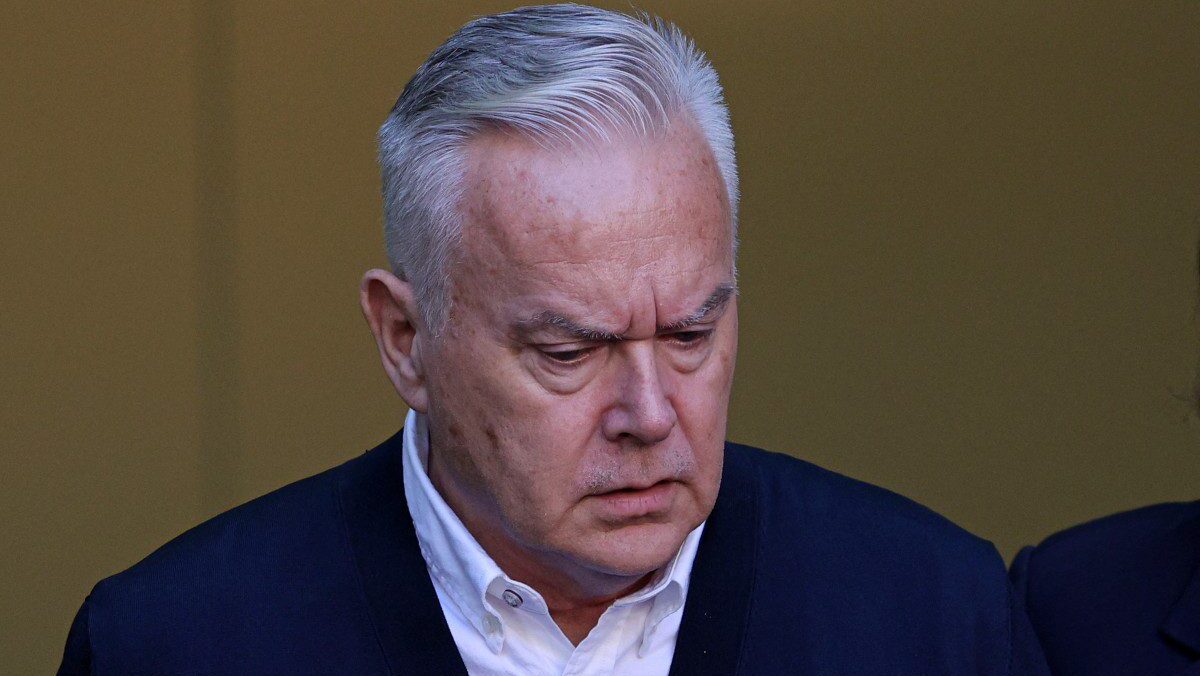
Photo: Adrian Dennis / AFP
The light sentencing this week of a high-profile convicted child sex offender has triggered nationwide anger, with many comparing this to the harsher punishment of people connected to the Southport riots.
Huw Edwards, the 63-year-old former BBC newsreader, was sentenced on Monday for child sex offences, after he sent £1,500 (€1,780) to a convicted paedophile who shared 41 pornographic images of children as young as seven with him.
The details of this case are sickening. After receiving one image of a boy as young as 13, Edwards replied: “Amazing.” He also sent Alex Williams, the man who supplied the pornographic images, cash for Nike trainers after Williams asked for “a Christmas gift after all the hot videos.”
These sick acts were followed by an all-too-predictable failure of British justice. Edwards—who became one of the BBC’s most well-known newsreaders, and was entrusted to cover such significant events as the state funeral of Her Majesty Queen Elizabeth II—was handed a six-month suspended jail term, meaning he has avoided being behind bars.
Edwards will also be put on the sex offenders’ register for seven years, meaning he has to keep the police informed of his whereabouts. But Liam Kotrie, a criminal defence solicitor who has dealt with hundreds of similar cases, said it was “very rare” for someone who, like Edwards, received a Category A image—the most serious kind—not be sentenced in crown court or to receive a sexual harm prevention order. Kotrie told MailOnline:
I’ve never heard of a case of possession of Category A images that stayed in [lower] magistrates court for sentencing, it’s very unusual. I’ve never had that and I’ve done hundreds of them.
That Edwards has got away so lightly, at a time when people arrested during the riots triggered by the Southport stabbing spree are serving actual prison time, has caused outrage online.
Writer and trade unionist Paul Embery is appalled by “the fact that [53-year-old] Julie Sweeney was jailed for 15 months for posting an impetuous and unpleasant statement on social media while Huw Edwards walks free after being convicted of making indecent images of children shows the sickness at the heart of our justice system.” Sweeney called for a mosque to “be blown up with the adults inside.”
Reform UK MP Lee Anderson added that this distinction—which even the BBC’s Newsnight programme referenced on Monday evening—was proof of a “two tier judicial system.” Party leader Nigel Farage said it was “no wonder the public have lost faith in our institutions.”
Starmer's Britain.
— Lee Anderson MP (@LeeAndersonMP_) September 16, 2024
So this is what they mean when they say we have a two tier judicial system.
This pervert should be caged and the MSM should be talking about the victims in all of this.
The victims being children who must have suffered so much. pic.twitter.com/1xoOlaOF5U
Huw Edwards will not receive a custodial sentence and is still entitled to a large BBC pension. No wonder the public have lost faith in our institutions.
— Nigel Farage MP (@Nigel_Farage) September 16, 2024
Even leading members of the Conservative Party, which has long been soft on crime, have weighed in on the issue—as did Twitter/X owner Elon Musk, who accused Britain of having “misplaced priorities.”
Tory leadership candidate Kemi Badenoch calls for a root and branch review of sentencing guidelines, "it does feel there's one law for some… and another for others".
— Talk (@TalkTV) September 17, 2024
"I want a society where paedophiles are going to prison, not just socially shamed".@JuliaHB1 @KemiBadenoch pic.twitter.com/5KrQQpEcmK
And, perhaps most damningly, children’s campaigner Molly Kingsley complained that “the failure to jail a prominent TV personality who has solicited and stored sexual images of kids as young as seven disembowels the UK government’s claim to be creating the safest country online for kids.”
The failure to jail a prominent TV personality who has solicited and stored sexual images of kids as young as 7 disembowels the UK Government’s claim to be creating the safest country online for kids and negates the entire premise of the Online Safety Act.
— Molly Kingsley (@lensiseethrough) September 17, 2024
We might as well… pic.twitter.com/robhSIFgrq
Chief magistrate Paul Goldspring said in his sentencing remarks that he had considered how Edwards had tried to explain his behaviour to psychiatrists by discussing his “monstrous” father and the impact on him of failing to get into Oxford University and going to Cardiff instead.
I didn’t get into Oxford and therefore felt anxious around my BBC colleagues which in turn helped set the stage for my interest in abusing children is one of the most elite narratives ever.
— Matt Goodwin (@GoodwinMJ) September 18, 2024
Edwards’ reputation is certainly in tatters, but he will now be more than able to hide away with his wealth while—as Bow Group chairman Ben Harris-Quinney highlighted—“people who have tweeted against immigration policies have gone to prison and lost everything.”
“Fair,” joked Harris-Quinney, “to say justice has been done.”
I think in the end Huw Edwards has had nigh on 2 years off work, a payout of around £500k, & now retires a free man on a comfortable pension.
— Ben Harris-Quinney (@B_HQ) September 16, 2024
Meanwhile people who have tweeted against immigration policies have gone to prison & lost everything.
Fair to say justice has been done. https://t.co/B952cioFAc
While British criminal law lacks a system of national sentencing, the discrepancy remains glaring. Suspicion abounds that Edwards’ previous high status protected him from a more appropriate sentence. As comedian Simon Evans tweeted, “Come on. We can’t have someone of Huw Edwards’ quiet dignity, doing porridge with a common meme poster.”
Come on. We can’t have someone of Huw Edwards’ quiet dignity, doing porridge with a common meme poaster. https://t.co/PTteEypNxC
— simon evans (@TheSimonEvans) September 16, 2024
